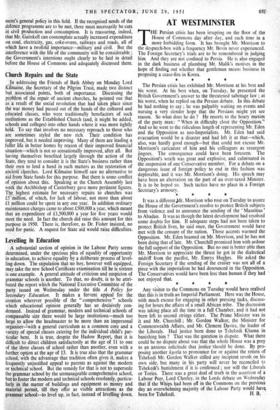Civil Needs and Defence
When Mr. Aneurin Bevan, Mr. Clement Davies and Mr. r Churchill successively appeal 1 for the issue of a White Paper on a particular subject, it .usf be concluded that the case for the issue of a White Paper s strong. Mr. Gaitskell, after making a lengthy statement on cuts and Controls a week ago, did not think it was. It is to be hopeclathat he will think again, for when what is in question is some reduction in the plant and machinery engaged on civil production in the engineering industry in 1951, and a substantial reduction In 1952, a reduction in the licences for civil building, a smaller increase than was contemplated in Investment on education and prohibition on new office-building and any building projects for entertainment purposes costing over £5,000, there is obviously material for a debate, and strong reason for a debate ; and for that purpose fuller particulars than the Chancellor gave in a non-debatable statement after Questions are clearly necessary. No one is likely to challenge the Govern- ment's general policy in this field. If the recognised needs of the defence programme are to be met, there must necessarily be cuts in civil production and consumption. It is reassuring, indeed, that Mr. Gaitskell can contemplate actually increased expenditure on coal, electricity, gas, coke-ovens, railways and roads, all of which have a twofold importance—military and civil. But the interference with the life of the community will be considerable ; the Government's intentions ought clearly to be laid in detail before the House of Commons and adequately discussed there.



































 Previous page
Previous page